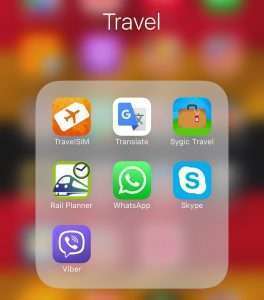Are you planning to head off on your first overseas adventure? While travelling is one of the most exciting and worthwhile things you can do, it can be a little overwhelming travelling on your own for the first time. You will be in a foreign city where you don’t know anyone and there are a lot of things you need to be responsible for, and a lot of things you may not have even considered.
To make the lead up to your trip a little more stress free, and to help you get organised so you can get excited about your upcoming adventure, we’ve put together a list of 10 things you should know before you go.
1. Suitcase or Backpack?
The age-old question, what to try and stuff all your valuable belongings in?! This changes based on personal preference but sometimes it can also change depending on the type of trip you are taking. If you’re doing a group tour of some kind (great choice!) make sure you ask your travel agent what luggage size is allowed on your bus or ship as sometimes there are weight or size restrictions. If you are moving around a lot or trekking along the way, then you may prefer a backpack so you can get around with ease. If you are mostly flying between destinations or want the convenience of being able to pack and unpack with ease then a suitcase may be for you.
TIP: Personally, I’ve always travelled with a suitcase as I feel like I can get more in and packing and re-packing is more convenient. Wheeling it through winding cobblestone streets in Europe has its challenges – but when you manage to drag your 16kg suitcase around for 8 weeks, on and off trains on your own without any assistance, then you look back with (some funny stories) and a strange sense of accomplishment!
2. V.I.D (Very Important Documents!)

Travelling overseas will mean you have some very important documents on you, the most important one being your passport! A passport must be arranged before you can travel overseas and from the date that you are due to arrive back from your journey it has to have more than 6 months remaining before it expires. Keeping this safe while you are away is very important, if you don’t want to carry it around during the day make sure you lock it in your hotel safe or if you don’t have one lock it in your suitcase. If you are staying in shared accommodation it is always a good idea to keep it with you at all times.
Some countries require you to obtain a visa before entering, your travel agent will advise this at the time of booking and be able to help you arrange it.
You’ll also need to make sure you keep any tickets, vouchers or booking documents with you ready for when you need to check in for a flight or accommodation. You can keep these in the travel wallet your travel agent gives you and because you won’t need them every day it’s a good idea to keep them in your luggage until you have a travel day.
TIP: Make a copy of all your documents, passport, travel cards etc and leave them at home with a parent or a friend. In case anything goes missing while you are away, they will have a copy of it to help from back home.
3. Make the most of your money

One of the biggest challenges of exploring the world is understanding different currencies and exchange rates. These can go up and down and can change multiple times depending on what countries you are visiting. It’s always a good idea to have some money on you before you leave, in case you can’t find an ATM when you arrive. You can change money at most banks that have a travel exchange, or there are multiple currency exchange places located in the Adelaide CBD. Be sure to keep a look out online to see what the rates are before you go.
A credit card is always good to have when travelling for any emergencies that may arise, however I’ve always found it better for my budget if I used a Travel Card for my day to day spending. This is a card that you can pre-load money on too ready to go. You can load multiple currencies onto the one card and it locks in the rate of the day when you load it on. It is like a Debit Card, which means you can use it at an ATM to withdraw money, or at a shop as a credit card. It means you can easily keep track of your spending and manage your budget over time, it also means you don’t have to carry large amounts of money with you wherever you go. If you run out along the way, you can re-load more money on from wherever you are in the world. You also get a second card (which you should keep separately or give to your travelling companion), so if you lose your card along the way you can simply call and cancel it and start using the back-up card instead. We sell these at Peregrine Travel Centre, but you can also get them from most banks, currency exchange places or even post offices.
TIP: Be careful of ATM fees, always withdraw enough to get you through a few days so that you aren’t paying fees for withdrawing every day, check with your bank before you travel for what fees may be incurred. There are no fees when using a cash passport card.
TIP 2: Make sure you tell your bank you are going overseas, that way they can make a note on your credit card and won’t cancel it if they see spending in a foreign country and think it has been stolen.
4.How to keep in touch while you’re away
We all want to keep in touch with our family and friends at home and share our holiday fun on Facebook or Instagram (to make everyone jealous) – just be careful you don’t come home to a phone bill that will keep you remembering your trip for a long time! Depending on where you are travelling, Wi-Fi may or may not be as accessible. For the most part through Europe and the US you will find free Wi-Fi in most restaurants, cafés and hotels along the way. With Wi-Fi you can do all the day to day checking of social media, emails and even contact home on apps like Viber or WhatsApp (see No. 8 below), but if you want to be able to call or message people you are travelling with or message home when you don’t have access to the internet then you will need to set-up your phone to do so.
You can set your current network up for International roaming by speaking with your provider. They can tell you the charges involved and how to set it up – but be careful, these charges can add up very quickly!
You can also purchase local pre-paid sim cards when you arrive at your destination and use these in your phone, which are much cheaper. However, you may need to change these along the way if they aren’t compatible across multiple countries or regions.
TIP: Buy a Travel Sim before you go. This is a sim that works in almost every country, you can set it up at home and load on your credit and it gives you all the fees upfront so you know what you are spending. You can also set this up to have data as well if you don’t have access to Wi-Fi. You can buy these from a post office, online and some phone shops. Some travel insurance organisations will provide you with one as part of your insurance.
5. Travel Insurance

Speaking of insurance…this is a MUST when travelling overseas! You may feel like it is just an added cost, but we can assure you that if something happens whilst you are away or for some reason you can no longer travel, it will be the most worthwhile item you budgeted for. If you can’t afford insurance, you can’t afford to travel.
TIP: The type of cover you need will change depending on what you are planning to do while on holiday. Speak to your travel agent about the right cover for your holiday.
6.Know your destination(s)
You don’t need to have every day planned to a tee, exploring and getting lost in a foreign city is half the fun of travelling. However, it’s always good to do a little bit of research to know what to expect. Find out what language the locals speak and learn a few words or phrases, find out what traditional foods you should try or if there are any specific laws or customs you should follow to respect local culture. Being respectful to the local people, making the effort to say hello or thank you in their language and knowing a little about their history and culture can go a long way with your experience in that country.
TIP: A bonus of a group tour is you will have a guide who will give you all the background knowledge you need to make your visit that extra bit more authentic.
7. Handy Travel apps
Travelling today is made a lot more accessible because of technology. There are several travel apps available to download before you go which can make being in a foreign city that little bit easier. Here’s a few of our favourites.

- Viber/ WhatsApp / Skype – a great way to stay in touch with family and friends back home. Call, Message or video call when you have free wifi and it’s a cheap way to stay connected
- Google Translate – if you’re heading to a country that English is not their first language, this app is quite handy for any quick translations to get you through ordering a meal or getting to a site
- Sygic Travel – a great app for helping you plan what sites are a must see in a city. Includes great restaurant suggestions as well and a handy platform to help you plan your day and how long it will take to get between sites.
- TravelSIM – if you’ve read No.4 above and decided to go with a Travel Sim then this app will help you manage your account while you are away
- Rail Planner / Subway / Tube Map – Again, depending on where you are going, it’s always a good idea to do a quick search for any rail, subway or underground apps that will help you with your public transport along the way.
TIP: You won’t always have access to the internet to use these apps, so if they can’t be used offline make sure you take some screenshots of the information you need in the morning before you head off for the day. That way, you’ll be able to remember the name of that great lunch spot when you are roaming the streets.
8. Don’t be afraid to try new things

Whether it’s tasting a local delicacy you never would have tried at home, going bungee jumping in the Swiss Alps, white water rafting in Austria or going to see your first musical on Broadway – make sure you make the most of your experience and try something new. Quite often these will be the things that stick with you long after your holiday is over, it might be something out of your comfort zone or something you normally would never do back home, no matter how big or small we promise you it will be something you will never forget!
TIP: Try to write down as many of these new experiences as you can. You may not be able to keep a day by day journal of your travels, but if every time you do something new you write down what it was, how you felt before and how you felt afterwards you’ll have some great stories to look back on when you come home and look at all your photos.
9. Make friends and memories

One of the best parts of travelling is meeting new people. Locals, other international travellers and even people from your home country. Take the time to talk to people along the way, it will give you a whole new insight into how people all around the world live.
TIP: A group tour is a great way to make friends, whether you are travelling alone or with others, a group tour gives you a whole different atmosphere when travelling. You’ll have people to sightsee with, to have dinner and drinks with and once it is all over you’ll have friends all around the world who share the same amazing memories as you do (and an excuse to travel again to go visit them)!
10. The most important thing…have fun!
It’s always important to be smart and safe when travelling; you don’t want to get into any trouble while you are away. But that doesn’t necessarily mean you should be scared or cautious of a new destination. You’ve worked hard to save enough money to plan your trip and so you should make sure you soak it all in and enjoy every moment. Eat, explore, shop, make new friends and fill up your memory stick with lots and lots pf photos!
Travelling and seeing the world is amazing, it gives you a whole new perspective on life and we promise you it will be an adventure you never forget (and if you are anything like us – the first of many many more amazing adventures!)
TIP: It can be easy to get carried away taking photos and video so you don’t forget a moment or breathtaking site, but make sure you do take the time to put your camera down and truly take it all in. Look around you, take in the sounds and smells and take a screenshot in your mind of the wonderful scene in front of you. When you are back home, you’ll be able to close your eyes and take yourself back to that special memory.
We can help you plan your first (or next) big adventure. Contact us and one of our experienced consultants will help you put together your dream holiday and help you with all of the preparations mentioned above. Happy Planning!






